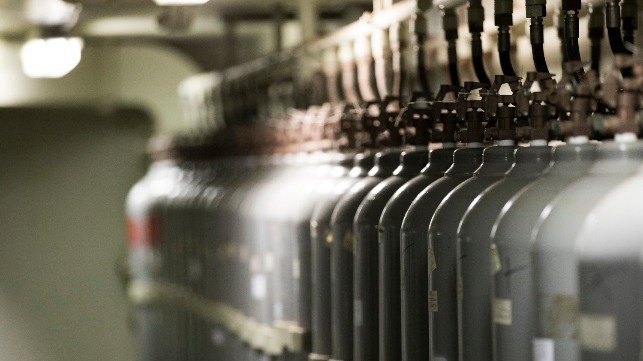Better Crew Training Needed for CO2 Firefighting Systems

Global safety leader Survitec is advising the maritime industry to ensure fixed fire-fighting systems are commissioned by their original equipment manufacturers and that crews undergo basic system configuration training, following a spate of incidents where ship fires have been exacerbated through incorrect use or installation of CO2-based extinguishing systems.
While the International Maritime Organization’s FSS Code provides engineering and design standards for all types of fire extinguishing systems, there are no mandatory regulations governing their installation and commissioning, only recommendations. Standards on operation and maintenance have improved over the last years but in many cases, they are still seen as guidelines
Survitec said that although these guidelines should be followed, there have been several incidents in recent times where fixed fire extinguishing systems have failed.
“While it is difficult to put a number on all the fire related incidents where incorrect installation, operation or maintenance of a fixed firefighting system has resulted in system failure, injury or death, the subsequent accident investigations offer a difference perspective on the effectiveness of the current regulations and guidelines,” said Mats Hestmann, Survitec Group QHSE Manager.
“Fire safety systems are inherently designed to protect and save lives. However, if these systems are incorrectly used, installed or insufficiently inspected and maintained, the consequences can be severe,” said Hestmann.
MSC.1/CIRC 1318, the Guidelines for the Maintenance and Inspections of Fixed Carbon Dioxide Fire-Extinguishing systems was released in June 2009 and have been adopted by most Flag states, but some are still following their own set of standards.
Hestmann, believes that it would be beneficial for MSC.1/CIRC 1318 to become even more structured as is the case with MSC 1432, clearly defining what should be inspected. Once the majority of flag states have adopted an MSC circular, it then becomes a resolution making it mandatory.
He adds: “Great improvements to safety have come as a result of IACS Z-17 Service provider approvals. However, it’s not the failure of the firefighting system that is resulting in so many incidents, but rather the lack of system knowledge and poor operator training. There should be more effective rules governing system training; because a crew member is familiar with one firefighting system doesn’t mean they are appropriately trained to use another manufacturer’s system or even a different system configuration. While the product itself might be standard, the layout of the system, the location of valves, cylinders, and vents and so on will differ from ship to ship. Certainly, crews need to be better trained in the use, operation and maintenance of these systems.”
Erik Christensen, Technical Director Fire Fighting said: “We have seen a number of incident reports where human error in the use of firefighting systems is a common factor. Valves have been closed when they should have been open, ventilation flaps left open with main generators still running during the fire.
“Carbon Dioxide is a dangerous gas and any system that has been incorrectly installed, maintained or operated could not only fail to extinguish the fire but be very harmful to the crew.”
As the market leader and a champion of maritime safety initiatives, Survitec is fostering greater fire safety and systems awareness across the industry. It has already issued advice notices and is raising wider awareness of the need to ensure firefighting systems are correctly installed, regularly maintained, serviced and that crew operating the systems are trained and understand how to use the specific system.
“We want to ensure that operators and crews have a much better understanding of how fixed firefighting systems operate and the importance of regular, properly carried-out maintenance. With greater knowledge, they will be able to overcome many of the operational challenges they face and prevent system failure when it is required in an emergency.
“Crews can be better equipped to fight fires more effectively, more safely, but any initiative needs to work in harmony with the rules, some of which could do well to be revised,” said Hestmann.
The products and services herein described in this press release are not endorsed by The Maritime Executive.

